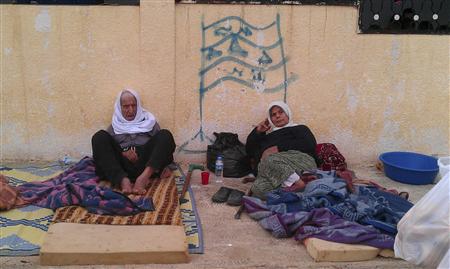(Reuters) – Turkey scrambled fighter planes to force a Syrian passenger jet to land and seized what it suspected was military equipment being ferried from Russia to Syrian President Bashar al-Assad’s forces.
The interception of the Syrian Air plane came hours after Turkey’s chief of staff warned that his troops would respond with greater force if shells from Syria continued to hit Turkish territory.
Military jets escorted the Damascus-bound Airbus A-320, which was carrying around 30 passengers from Moscow, into Ankara airport late on Wednesday after Turkey received intelligence that it was carrying military supplies.
The plane and its passengers were allowed to continue after parts of the cargo were seized. Officials gave no details of what was confiscated, saying investigations were underway, but some Turkish newspapers said the cargo included non-lethal supplies such as radio equipment.
“We are determined to control weapons transfers to a regime that carries out such brutal massacres against civilians. It is unacceptable that such a transfer is made using our airspace,” Foreign Minister Ahmet Davutoglu said.
“Today we received information this plane was carrying cargo of a nature that could not possibly be in compliance with the rules of civil aviation,” he said in Athens during an official visit, in comments broadcast live on Turkish television.
Davutoglu said Turkey was within its rights to investigate planes suspected of carrying military materials but declined to say what was in the cargo. Turkey would continue to investigate Syrian civilian aircraft using its airspace, he said.
Turkish authorities have also instructed Turkish passenger planes not to fly in Syrian airspace, saying it was no longer safe. A Reuters witness at the border saw at least one passenger plane turn around as it approached Syria and head back into Turkey on Wednesday.
There was no immediate reaction from Moscow, which has stood behind Assad’s government during an 18-month-old uprising that has killed some 30,000 people.
Rebels are outgunned by the government but can still strike at will, and President Bashar al-Assad has assumed personal command of his forces, convinced he can prevail militarily.
WIDENING CONFLICT
The Syrian Observatory for Human Rights said 70 people had been killed across Syria on Wednesday, including six rebels in the strategic town of Maarat al-Nuaman, on the north-south highway linking Aleppo to the capital Damascus.
Meanwhile, the conflict threatens to spill over Syria’s borders and ignite a wider Middle Eastern war, drawing in neighboring states and pitting Sunni Muslim states against Syria’s rulers and their allies including Shi’ite Iran.
Russia, from where the Syrian plane took off, has blocked tougher U.N. resolutions against Damascus.
“Once a week a Syrian Airlines airplane flies from Moscow bound for Damascus,” Interfax reported Vnukovo Airport spokeswoman Yelena Krylova as saying. “The plane took off normally, there were no incidents.”
Interfax cited her as saying 25 people were on board the chartered plane and it left 20 minutes after its scheduled afternoon departure time.
Turkey’s armed forces have bolstered their presence along the 900-km (560-mile) border and have been firing back over the past week in response to gunfire and shelling coming across from northern Syria, where Assad’s forces have been battling rebels who control swathes of territory.
“We responded but if it continues we will respond with greater force,” state television TRT quoted Turkey’s Chief of Staff, General Necdet Ozel, as saying.
Several mortar bombs landed outside the Syrian border town of Azmarin and heavy machinegun fire could be heard on Wednesday as clashes between the Syrian army and rebels intensified.
Plumes of smoke rose into the sky and cries of “God is Greatest” rang out between the bursts of gunfire. Scores of civilians, many of them women with screaming children clinging to their necks, crossed a narrow river marking the border with Turkey as they fled the fighting.
NATO Secretary-General Anders Fogh Rasmussen said on Tuesday the military alliance had plans in place to defend Turkey.
It is not clear whether the shells that have hit Turkish territory were aimed to strike there or were due to Syrian troops overshooting as they attacked rebel positions. Turkey has provided sanctuary for rebel officers and fighters.
(Additional reporting by Ece Toksabay and Seda Sezer in Istanbul, Gulsen Solaker in Ankara, Jonathon Burch in Hatay and Thomas Grove in Moscow; Writing by Andrew Roche; Editing by Ralph Boulton)

COMMENTS
Please let us know if you're having issues with commenting.